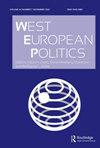Winter is coming: Russian gas, Italy and the post-war European politics of energy security
IF 4.5
1区 社会学
Q1 POLITICAL SCIENCE
引用次数: 0
Abstract
Abstract By focussing on the Italian case and on transformations in state-market relations in the natural gas sector, this article examines the post-war European politics of energy security. It argues that rather than fostering EU-level path-breaking measures, the war has brought back the ‘partner state’ in the EU energy realm. This model, which supported the structuration of East-West energy interdependence during the Cold War, envisages direct modes of state intervention and closer government-energy company cooperation at home and abroad. Although the return of the (partner) state is helping Western European consumers by reducing their dependence on Russian gas, it has negative implications. It favours intra-European competition, limits further supranational integration in the energy sector and risks undermining the EU climate goals. This latter risk can be amplified by the encounter of the partner state with right-wing populist climate-sceptic parties, while it can be mitigated by the ‘greening’ of the partner state.冬天来了:俄罗斯天然气、意大利与战后欧洲能源安全政治
本文章由计算机程序翻译,如有差异,请以英文原文为准。
求助全文
约1分钟内获得全文
求助全文
来源期刊

West European Politics
POLITICAL SCIENCE-
CiteScore
10.00
自引率
7.10%
发文量
58
期刊介绍:
West European Politics (WEP)has established itself as one of the most authoritative journals covering political and social issues in Western Europe. It has a substantial reviews section and coverage of all national elections in Western Europe. Its comprehensive scope, embracing all the major political and social developments in all West European countries, including the European Union, makes it essential reading for both political practitioners and academics.
 求助内容:
求助内容: 应助结果提醒方式:
应助结果提醒方式:


